
Those with underlying health conditions, elderly, front-line workers will receive shots first.
DAR ES SALAAM.
The Government of the United Republic of Tanzania has received one million doses of COVID-19 vaccines, donated by the US through the World Health Organization’s COVAX initiative.
The vaccines were received by Minister of Health, Community Development, Gender, Elserly and Children Dr. Dorothy Gwajima, and Foreign Minister Liberata Mulamula.
Speaking after handing over the consignment at the Julius Nyerere International Airport, American Ambassador to Tanzania Donald Wright said the US was sharing vaccines to save lives and to lead the world in bringing an end to the deadly pandemic.
“Sharing these vaccines also serve as another example of the strength of our 60-year partnership and our commitment to Tanzania,” he said.
Earlier, Dr. Gwajima said the government is expected to inoculate at least 35 million people, or 60% of the population, and priority will be given to those with underlying health conditions and the elderly.
She added that the first phase of jabs will be administered to front-line health workers although the ultimate goal is to get as many Tanzanians vaccinated as possible.
“We are committed to ensuring that every single Tanzanian who wishes to be vaccinated gets the jab for free,” she said.
COVAX is co-led by Gavi, the Coalition for Epidemic Preparedness Innovations (CEPI) and WHO alongside key delivery partner UNICEF. Its aim is to accelerate the development and manufacture of COVID-19 vaccines, and to guarantee fair and equitable access for every country in the world.
According to available data, COVAX has so far shipped over 138 million COVID-19 vaccines to 136 participants in the world.
The global pandemic has already caused the loss of hundreds of thousands of lives and disrupted the lives of billions more. As well as reducing the tragic loss of life and helping to get the pandemic under control, introduction of a vaccine will prevent the loss of US$ 375 billion to the global economy every month.
Global equitable access to a vaccine, particularly protecting health care workers and those most-at-risk is the only way to mitigate the public health and economic impact of the pandemic.
Ends–






